Abstract
Production by attached and free-living planktonic bacteria in two blackwater rivers in the Southeastern United States was measured over a period of 14 months by using the rate of incorporation of [methyl-3H]thymidine into DNA. Production rates and biomass dynamics were compared to determine the potential for in situ production to supply planktonic biomass. Bacterial production in these rivers was moderate and varied seasonally. Rates varied from 0.058 to 2.120 mg of C m−3 h−1 in the Ogeechee River and from 0.002 to 2.418 mg of C m−3 h−1 in Black Creek. Regressions of growth rate on various environmental variables showed that temperature and total dissolved organic carbon concentration were the best predictors of growth. Although attached bacteria were <21% of the total biomass, they accounted for up to 53% of the total production. Turnover times for attached bacteria ranged from <1 day to >3 years depending on season. Turnover times of free-living bacteria varied from 4.4 days to 11.8 years. Comparisons of biomass with production indicated that during most seasons, the majority of bacterial biomass in these rivers was of allochthonous origin. During summer, when water temperatures were high, bacterial growth in the river may have supplied a greater percentage of the standing stock of bacteria than allochthonous inputs.
Full text
PDF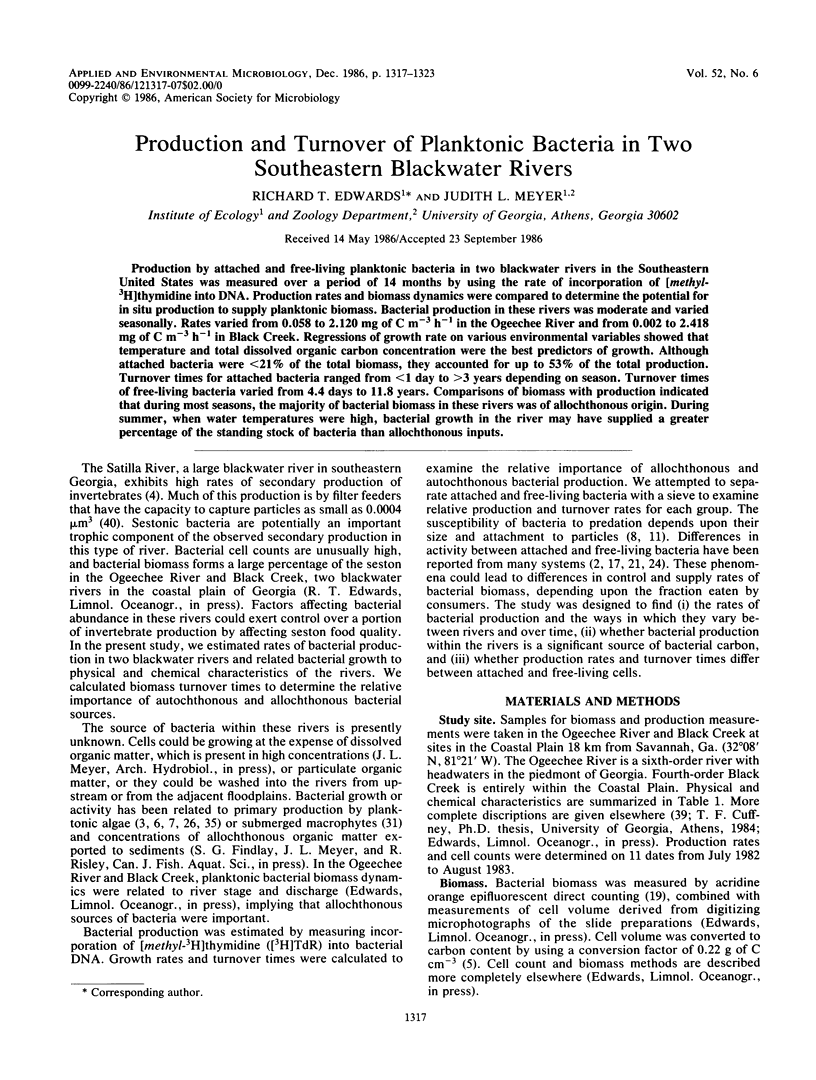
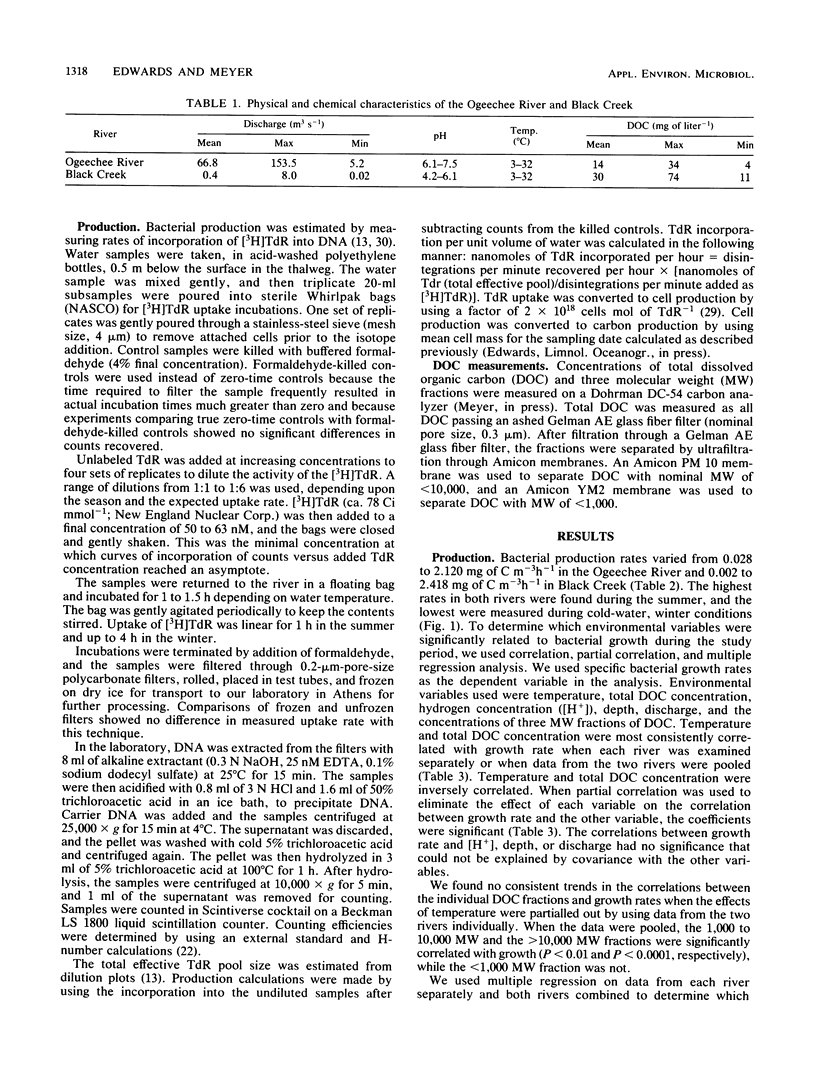
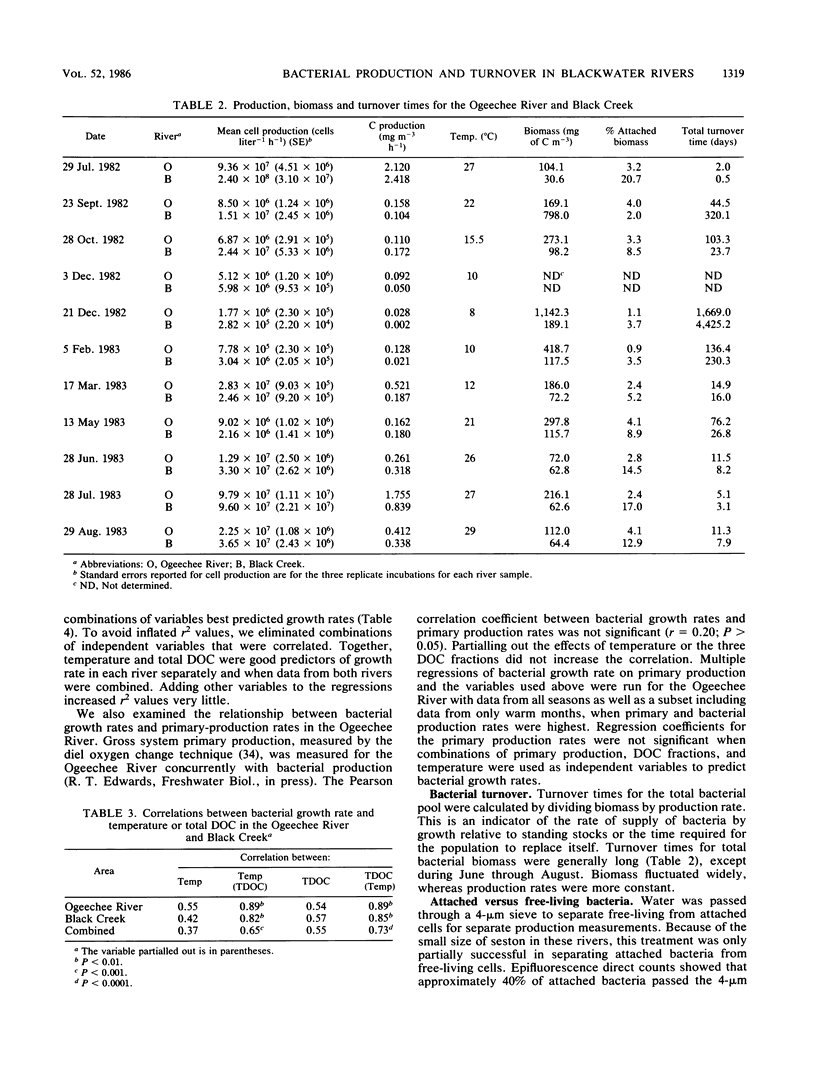
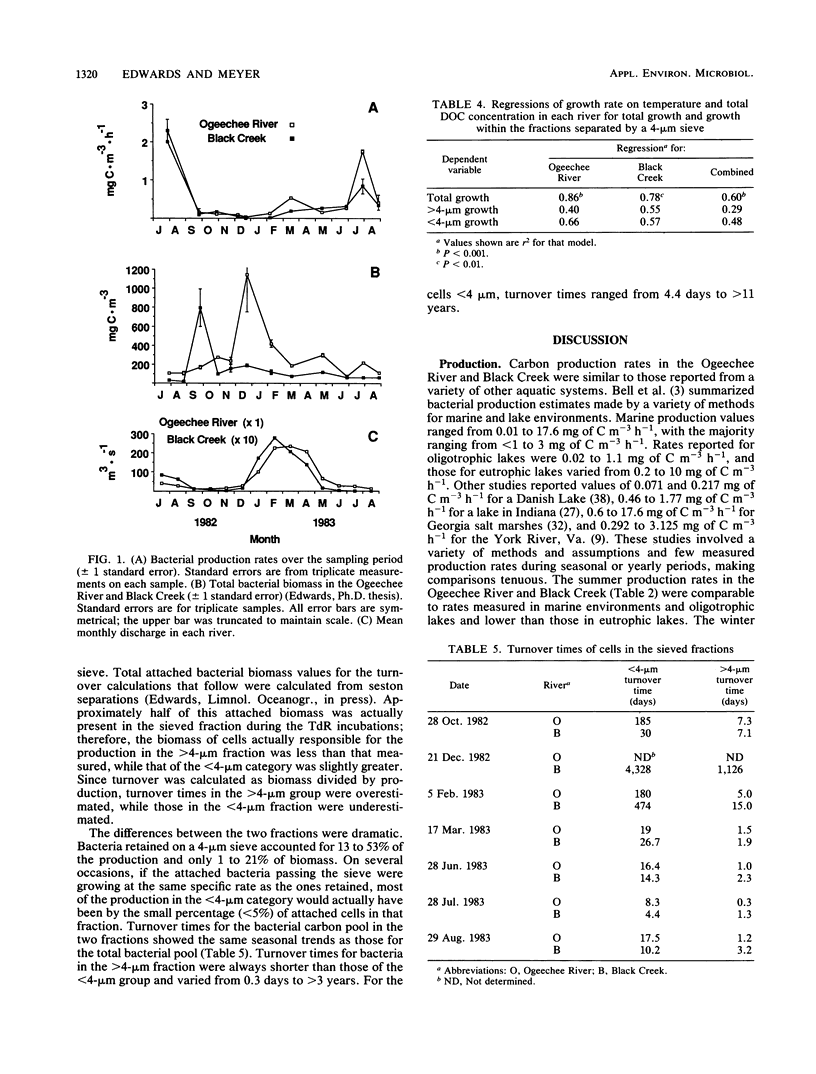
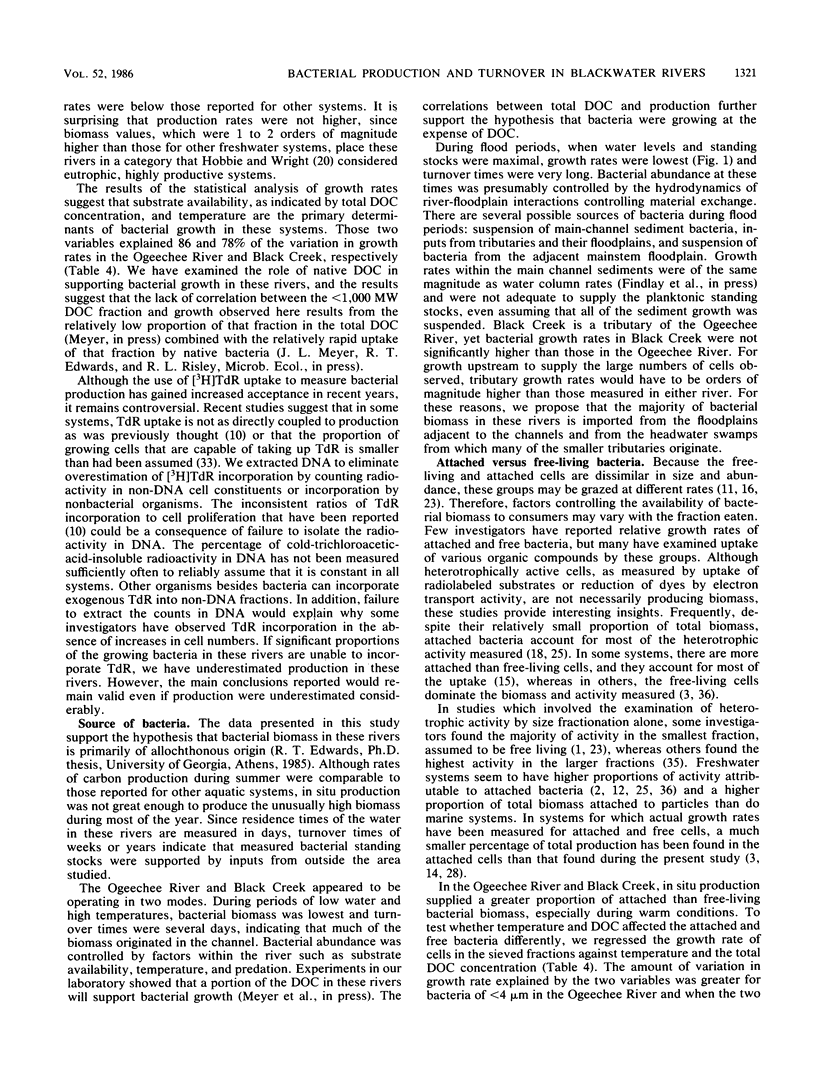
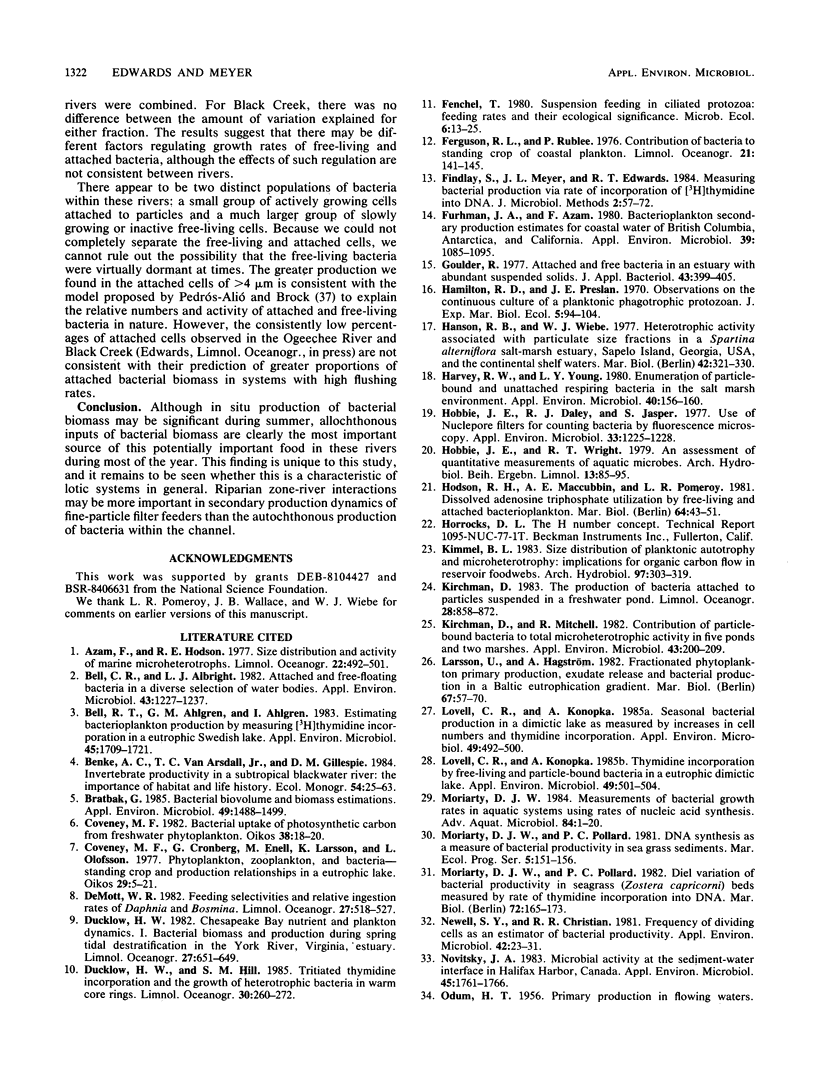
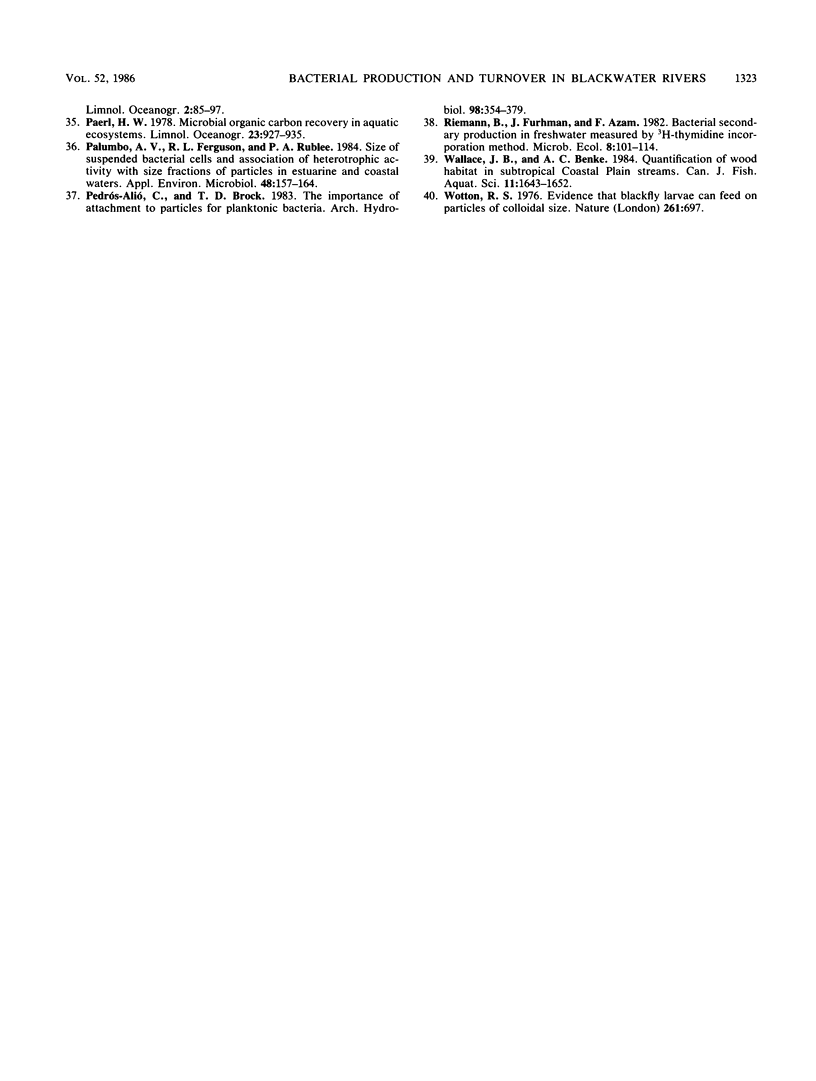
Selected References
These references are in PubMed. This may not be the complete list of references from this article.
- Bell C. R., Albright L. J. Attached and free-floating bacteria in a diverse selection of water bodies. Appl Environ Microbiol. 1982 Jun;43(6):1227–1237. doi: 10.1128/aem.43.6.1227-1237.1982. [DOI] [PMC free article] [PubMed] [Google Scholar]
- Bell R. T., Ahlgren G. M., Ahlgren I. Estimating Bacterioplankton Production by Measuring [H]thymidine Incorporation in a Eutrophic Swedish Lake. Appl Environ Microbiol. 1983 Jun;45(6):1709–1721. doi: 10.1128/aem.45.6.1709-1721.1983. [DOI] [PMC free article] [PubMed] [Google Scholar]
- Bratbak G. Bacterial biovolume and biomass estimations. Appl Environ Microbiol. 1985 Jun;49(6):1488–1493. doi: 10.1128/aem.49.6.1488-1493.1985. [DOI] [PMC free article] [PubMed] [Google Scholar]
- Fuhrman J. A., Azam F. Bacterioplankton secondary production estimates for coastal waters of british columbia, antarctica, and california. Appl Environ Microbiol. 1980 Jun;39(6):1085–1095. doi: 10.1128/aem.39.6.1085-1095.1980. [DOI] [PMC free article] [PubMed] [Google Scholar]
- Harvey R. W., Young L. Y. Enumeration of particle-bound and unattached respiring bacteria in the salt marsh environment. Appl Environ Microbiol. 1980 Jul;40(1):156–160. doi: 10.1128/aem.40.1.156-160.1980. [DOI] [PMC free article] [PubMed] [Google Scholar]
- Hobbie J. E., Daley R. J., Jasper S. Use of nuclepore filters for counting bacteria by fluorescence microscopy. Appl Environ Microbiol. 1977 May;33(5):1225–1228. doi: 10.1128/aem.33.5.1225-1228.1977. [DOI] [PMC free article] [PubMed] [Google Scholar]
- Kirchman D., Mitchell R. Contribution of particle-bound bacteria to total microheterotrophic activity in five ponds and two marshes. Appl Environ Microbiol. 1982 Jan;43(1):200–209. doi: 10.1128/aem.43.1.200-209.1982. [DOI] [PMC free article] [PubMed] [Google Scholar]
- Lovell C. R., Konopka A. Seasonal bacterial production in a dimictic lake as measured by increases in cell numbers and thymidine incorporation. Appl Environ Microbiol. 1985 Mar;49(3):492–500. doi: 10.1128/aem.49.3.492-500.1985. [DOI] [PMC free article] [PubMed] [Google Scholar]
- Lovell C. R., Konopka A. Thymidine incorporation by free-living and particle-bound bacteria in a eutrophic dimictic lake. Appl Environ Microbiol. 1985 Mar;49(3):501–504. doi: 10.1128/aem.49.3.501-504.1985. [DOI] [PMC free article] [PubMed] [Google Scholar]
- Newell S. Y., Christian R. R. Frequency of dividing cells as an estimator of bacterial productivity. Appl Environ Microbiol. 1981 Jul;42(1):23–31. doi: 10.1128/aem.42.1.23-31.1981. [DOI] [PMC free article] [PubMed] [Google Scholar]
- Novitsky J. A. Microbial activity at the sediment-water interface in halifax harbor, Canada. Appl Environ Microbiol. 1983 Jun;45(6):1761–1766. doi: 10.1128/aem.45.6.1761-1766.1983. [DOI] [PMC free article] [PubMed] [Google Scholar]
- Palumbo A. V., Ferguson R. L., Rublee P. A. Size of suspended bacterial cells and association of heterotrophic activity with size fractions of particles in estuarine and coastal waters. Appl Environ Microbiol. 1984 Jul;48(1):157–164. doi: 10.1128/aem.48.1.157-164.1984. [DOI] [PMC free article] [PubMed] [Google Scholar]
- Wotton R. S. Evidence that blackfly larvae can feed on particles of colloidal size. Nature. 1976 Jun 24;261(5562):697–697. doi: 10.1038/261697a0. [DOI] [PubMed] [Google Scholar]


